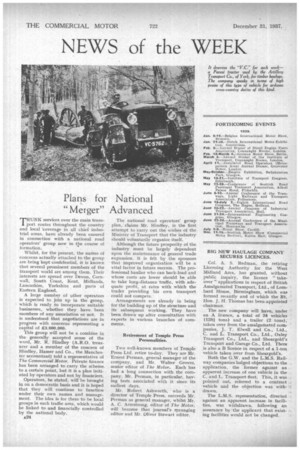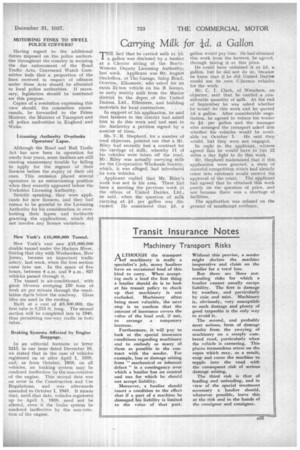NEWS of the WEEK
Page 4

Page 5

If you've noticed an error in this article please click here to report it so we can fix it.
Plans for National "Merger" Advanced
TRUNK services over the main transport routes throughout the country and local coverage in all chief industrial areas, have already been ensured in connection with a national road operators' group now in the course of formation.
Whilst, for the present, the names of concerns actually attached to the group are being kept confidential, it is known that several prominent members of the transport world are among them. Their interests are spread over Devon, Cornwall, South Coast, Kent, Midlands, Lancashire, Yorkshire and parts of Eastern England.
A large number of other operators is expected to join up in the group, which is ready to incorporate suitable businesses, whether they have been members of any association or not. It is understood that negotiations are in progress with concerns representing a capital of £3,000,000.
This group will not be a combine in the generally accepted sense of the word, Mr, R. Hindley (A.R.O. trdasurer and a member of the concern of Hindley, Hamer and Co., the Manchester accountant) told a representative of The Commercial Motor. Private finance has been arranged to carry the scheme. to a certain point, but it is a plan initiated by operators and not by financiers.
Operators, he stated, wilrbe brought in on a democratic basis and it is hoped that they will continue to function under their own names and management. The idea is for there to be local groups in each traffic area, which would be linked to and financially controlled by the national body.
A24 The national road operators' group plan, claims Mr. Hindley, is the first attempt to carry out the wishes of the Minister of Transport that the industry should voluntarily organize itself.
Although the future prosperity of the industry must be largely dependent upon the maintenance of general trade expansion, it is felt by the sponsors that improved organization will be a vital factor in future success. The professional haulier who can back-load and whose costs are lower should be able to take long-distance traffic, with adequate profit, at rates with which the trader providing his own transport could not compete.
Arrangements are already in being for the building up of the structure and its subsequent working. They have been drawn up after consultation with experts in various branches of commerce.
Retirement of Temple Press Personalities.
Two well-known members of Temple Press Ltd. retire to-day. They are Mr. Ernest Ferman, general manager of the company, and Mr. Walter Groves, senior editor of The Motor. Each has had a long connection with the company, Mr. Perman, in particular, having bee'n associated with it since its earliest days.
Mr. Robert Ashworth, who is a director of Temple Press. succeeds Mr. Ferman as general manager, whilst Mr. A. C. Armstrong, editor of The Motor, will become that journal's managing editor and Mr. Oliver Stewart editor. BIG NEW HAULAGE COMPANY SECURES LICENCES.
Col. A. S. Redman, the retiring Licensing Authority for the West Midland Area, has granted, without public inquiry, the licence " takeover" applications in respect of British Amalgamated Transport, Ltd., of Lombard House, Birmingham, which was formed recently and of which the Rt. Hon. J. H. Thomas has been appointed chairman.
The new company will have, under an A licence, a total of 34 vehicles (138i tons) and a trailer (2 tons), taken over from the amalgamated companies, J. T. Elwell and Co., Ltd., C. and L. Transport Co., Ltd., Oxley Transport Co., Ltd., and Sheargold's Transport and Garage Co., Ltd. There is also a B licence in respect of a 1-ton vehicle taken over from Sheargold's.
Both the G.W. and the L.M.S. Railway companies lodged objections to the application, the 'former against an apparent increase of one vehicle in the C. and L. Transport fleet. This,, it was . pointed out, referred to a contract vehicle and the objection was withdrawn.
The L.M.S. representation, directed against an apparent increase in facilities, was withdrawn, following an assurance by the applicant that exist ing facilities would not be changed. t MOTORING FINES TO SWELL POLICE COFFERS?
Having regard to the additional duties imposed on the police authorities throughout the country in securing the due enforcement of the Road Traffic Acts, Gravesend Watch Committee feels that a proportion of the fines received in respect of offences under these Acts should he allocated to local police authorities. If necessary, legislation should be instituted tor this purpose.
Copies of a resolution expressing this view should, the committee recommends, be forwarded to the Prime Minister, the Minister of Transport and all police authorities in England and Wales.
Licensing Authority Overlooks Operators' Lapse.
Although the Road and Rail Traffic Act has now been in operation for nearly four years, some hauliers are still causing unnecessary trouble by failing to apply for the regrant of their licences before the expiry of their old ones. This omission placed several operators in an embarrassing position when they recently appeared before the Yorkshire Licensing Authority.
Strictly speaking, they were applicants for new licences, and they had reason to be grateful to the Licensing Authority for his consideration in overlooking their lapses and forthwith granting the applications, which did not involve any licence variations.
New York's £15,000,000 Tunnel.
New York's vast new £15,000,000 double tunnel under the Hudson River, linking that city with Weehawken, New Jersey, became an important traffic artery, last week, when the first section came into use. In the space of five hours, between 4 a.m. and 9 a.m., 821 vehicles passed through it.
The tunnel is air-conditioned, with giant blowers sweeping 150 tons of fresh air per minute through the ventilation ducts helms the roadway. Glass tiles are used in the roofing.
Built at a cost of £8,400,000, the first tube is 8,215 ft. long. The second section will be completed late in 1040, thus permitting one-way traffic in both tubes.
Braking Systems Affected by Engine Stoppage.
In an editorial footnote to letter 5215, in our issue dated December 10, we stated that in the case of vehicles registered on or after April 1, 1938, and, • as from October, 1938, on all vehicles, no braking system may be rendered ineffective by the non-rotation of the engine. This second date was an error in the Construction and Use Regulations, and was afterwards amended to October 1, 1943. It means that, until that date, vehicles registered up to April 1, 1938, need not be altered, even if the brake system be rendered ineffective by the non-rotation of the engine.
































